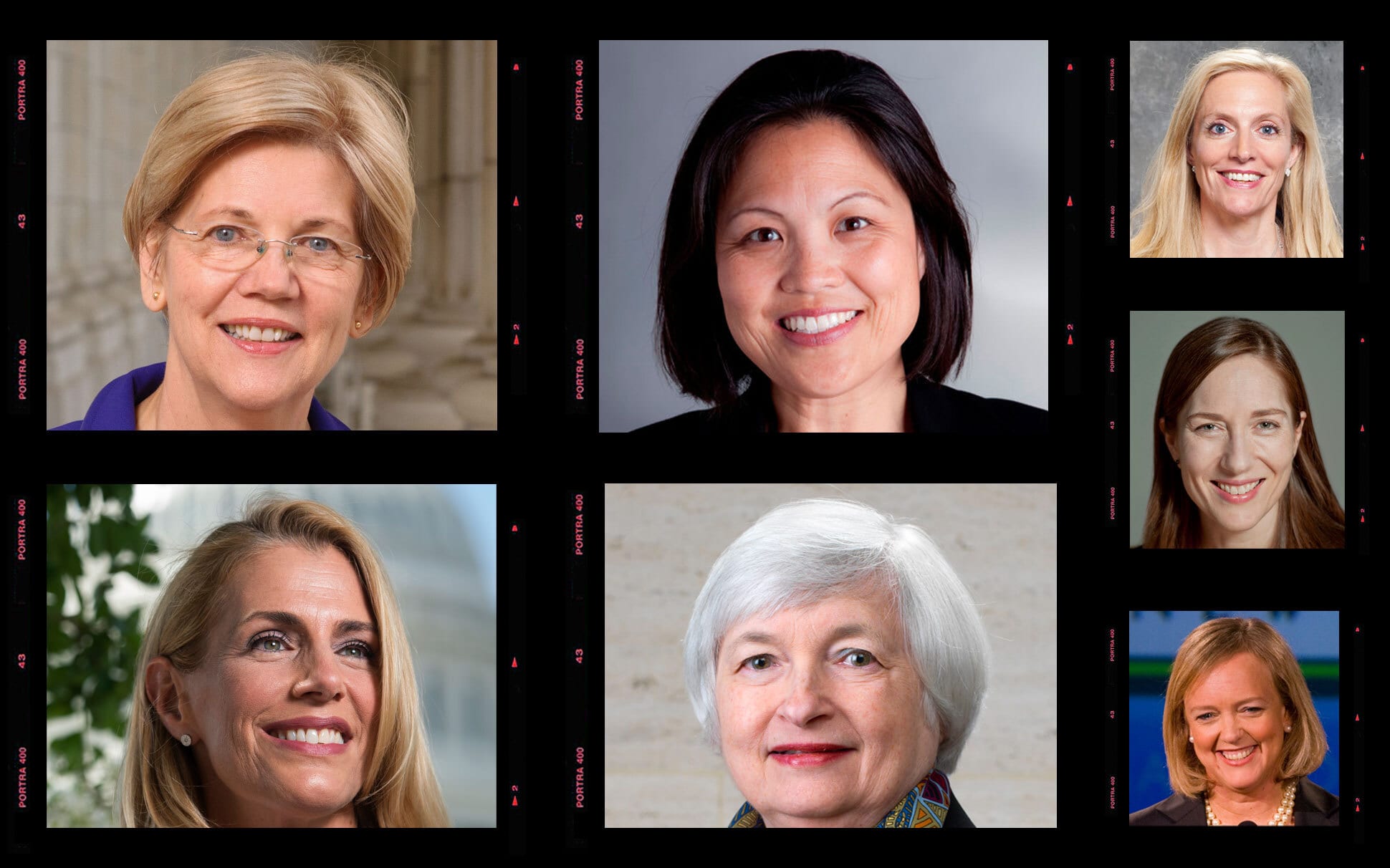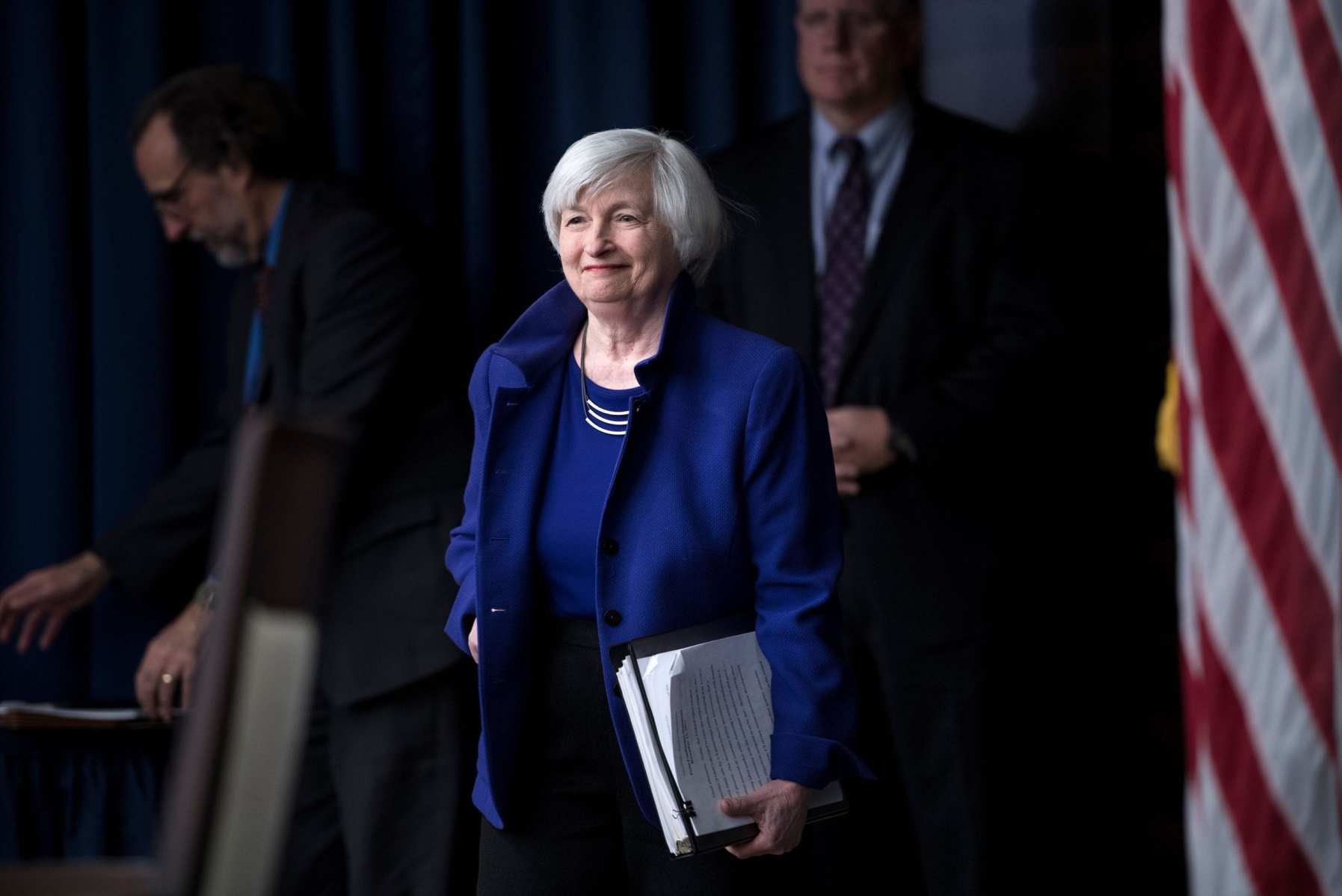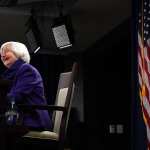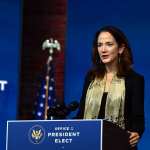President-elect Joe Biden has the potential to place women at the helm of the nation’s top economic advisory positions — and help shatter another glass ceiling on the way.
In the conversation for the three cabinet positions most associated with the economy — Treasury, Commerce and Labor — are several top female economists and business leaders who together could help shape the post-pandemic recovery. If the Treasury role, in particular, goes to one of the female frontrunners, it would be the first time a woman holds that post after a 231-year history of White men in the role.
“It wasn’t that long ago that there were designated cabinet positions for women, and the world has moved past limiting women to Health and Human Services and Education, for example,” said Daniel Schnur, a political communications professor at the University of California, Berkeley and the University of Southern California. Now, with women in talks for the Treasury position, “it looks very likely that that long overdue step is about to be taken.”
The two women who have risen to the top of the list for Treasury are Lael Brainard, the lone Democratic voice on the Federal Reserve Board of Governors, and Janet Yellen, the former chair of the Federal Reserve. Also in discussion: Sen. Elizabeth Warren and Sarah Bloom Raskin, who also sat on the Fed’s board and was a former deputy secretary of the Treasury.
The pick is consequential, not just because it’s the top economic cabinet position, but because of what it will say about the incoming Biden administration, said Schnur, who was also a longtime Republican strategist.
“The identity of the Biden Treasury secretary will tell us a great deal about how aggressive he intends to be, not only on stimulus, but on a range of other economic issues,” he said.
The continued economic devastation of the coronavirus pandemic has, post-election, put the question of another stimulus package back into focus. So far this year, House Speaker Nancy Pelosi and current Treasury Secretary Steven Mnuchin have led those talks, working with parameters set by Mitch McConnell’s Senate, which have recently stalled once again. There’s no doubt whomever Biden chooses for Mnuchin’s seat will take up the mantle of passing coronavirus relief — a package Democrats and Republicans agree is needed but remain divided on its scope.
That’s why a centrist choice may be the best approach for a Biden administration, said Bill Whalen, a research fellow at the Hoover Institution at Stanford University and a political analyst. Whalen believes a moderate would signal “stability” for the markets, and, politically, has the potential to sail through confirmation.
Brainard’s work at the Fed has been praised for its analytical approach and command of fiscal and monetary policy. She previously served as the Treasury undersecretary for international affairs, a role that made her a key global negotiator, including in deliberations with China on a more flexible currency.
“She’s held in very high regard in both political and finance circles, which is no easy feat,” Schnur said. “And she would provide a strong centrist voice in a position where Biden’s own ideological stamp is going to be very important.”
Yellen would also bring decades of experience to the position. She was the first woman to chair the Federal Reserve from 2014 to 2018. Yellen has served on the Federal Reserve Board of Governors, as the president and CEO of the Federal Reserve Bank of San Francisco and as chair of former President Bill Clinton’s White House Council of Economic Advisers. As chair of the Fed, Yellen worked to keep interest rates low to combat unemployment, an achievement that earned her high praise.
The world has moved past limiting women to Health and Human Services and Education [secretaries].
Daniel Schnur, political communications professor at the University of California, Berkeley and longtime Republican strategist
Heidi Hartmann, founder of the Institute for Women’s Policy Research, said Yellen would be a wise choice for the role.
“She has an extremely thorough decision-making system, she looks at all sides, she is very good at building consensus, she respects everyone’s opinion, she is very clear in her communication,” Hartmann said. “She is extremely thoughtful and I think she can be persuasive because of her gravitas.”
Hartmann, who went to graduate school for economics at Yale University after Yellen, said Yellen was so distinguished that students — including Hartmann herself — kept the notes she took as a teacher’s assistant for economist James Tobin, the 1981 Nobel laureate, for many years.
Thea Lee, the president of the Economic Policy Institute, said Yellen’s work on unemployment as chair of the Federal Reserve helped “tilt the balance of priorities at the Fed” away from just controlling inflation.
“[Brainard and Yellen] have been through the political ringer a lot,” Lee said. “They both have a good shot at confirmation.”
The issue of confirmation is what has likely put Sen. Warren, who has rallied against Wall Street and cemented herself as a progressive leader, lower on the list. Not only is a likely Republican-controlled Senate less willing to confirm her, but with razor thin margins in that body, it would be a risk for Democrats if Warren lost her Senate seat. That would create an opening for Republican Massachusetts Gov. Charlie Baker to appoint an interim replacement. If Biden were looking for a reason not to select Warren, Schnur said, “then the very close balance and the makeup of the Senate gives him more than adequate cover.”
In the end, the confirmation of any appointment may come down to other female senators — Republican moderates like Maine’s Susan Collins or Alaska’s Lisa Murkowski.
Schnur said “it’s going to be very difficult for Biden to get anything through the Senate that doesn’t have the support” of either Collins, Murkowski or both — regardless of the outcome of two Georgia runoff elections that will determine which party controls the Senate.
So far, it’s unlikely Biden will announce his cabinet nominations for another few weeks. Until then, Whalen, the Hoover Institution fellow, said the president-elect’s strategy of not boxing himself into a commitment to choose a woman for the roles may work in his favor — a lesson learned from past presidents like Bill Clinton.
Clinton said he would nominate the first female attorney general in his first term, but his first two choices were derailed when it was revealed both employed undocumented immigrants as nannies — a scandal called “Nannygate” — before he ultimately picked Janet Reno.
Biden’s strategy is “very smart politics,” said Whalen. “It keeps us all in suspense, but it also keeps you from, in case one pick doesn’t work out, kind of a comedy of errors Clinton ran into … The one thing that stands out at this point is you see a long list of women who are in play, but there is not a mandate, per se.”

As for the other economic roles in Biden’s cabinet, including Commerce and Labor, it’s less clear what direction Biden will take. The two positions, which carry less political weight than the Treasury job, could be opportunities to appeal to both Republicans and progressive Democrats.
For Commerce, one of the top names in contention is Meg Whitman, the CEO of the now-defunct mobile streaming service Quibi, former president and CEO of eBay and a former Republican candidate for California governor.
In the past two elections, Whitman has supported former Democratic presidential nominee Hillary Clinton and Biden. Whitman also spoke at the Democratic National Convention in August. “Donald Trump has no clue how to run a business, let alone an economy,” she said at the DNC. “Joe Biden, on the other hand, has a plan that will strengthen our economy for working people and small-business owners. For me, the choice is simple.”
Her nomination “would send a signal that he wants an inclusive administration,” Whalen said, though he added he has doubts Biden would place her in that high of a position.
The president-elect has spoken often about his hope of reuniting the parties and returning to a cabinet that has members from both sides — a tradition Trump broke with.
Speaking about the ongoing coronavirus stimulus discussions, Biden said this week that the refusal of Democrats and Republicans to cooperate is a conscious choice.
“If we can decide not to cooperate, then we can decide to cooperate,” Biden said Monday. “And I believe that this is part of the mandate from the American people. They want us to cooperate.”
Traditionally, though, bipartisan picks have gone in other slots, like the Transportation secretary or the Defense secretary.
Commerce, beyond representing U.S. businesses in the cabinet, carries an expansive agenda: It is also responsible for the U.S. Census Bureau and several climate organizations, including the National Weather Service and the National Oceanic and Atmospheric Administration (NOAA).
Lee doesn’t think Whitman would be a good fit for Commerce because of her long history and deep connections with the business world, instead of a focus on some of the incoming Biden administration’s key policy focus areas like a living wage and child care.
“I think that if somebody who has been on the Republican side of the aisle embraces the big goals and policies, that’s one thing,” said Lee, of the Economic Policy Institute. The flip side could be “a cabinet that’s squabbling amongst itself — the whole ‘team of rivals’ idea.”
Progressives could get their due in the pick for Labor secretary, which has several women in the conversation, including California Labor Secretary Julie Su and Association of Flight Attendants-CWA president Sara Nelson.
Su is an expert in workers’ rights and civil rights, and her work has looked at issues of wage theft and labor abuses in the garment industry. Nelson is a rising figure in the labor movement, gaining prominence after threatening a general strike during the 2019 government shutdown.
Because of Biden’s focus on working with labor unions during his term — some of his policy proposals, like a federal $15 minimum wage, have strong union support — it’s possible the Labor secretary position could carry more weight in his administration, particularly if he chooses political heavyweights like Warren or Sen. Bernie Sanders, who is reportedly interested in the position.
For now, it seems the two names that have risen to the top of the list are Boston Mayor Marty Walsh and Michigan Democratic Rep. Andy Levin, who each have the support of different union leaders.
A woman in that role could work to bring the value of her lived experiences to the table, Lee said, particularly in a year where women, more so than men, have been pummeled by an unequal recession that has decimated careers and sidelined working mothers. Nelson, the flight attendant association president, for example, was a key negotiator in a $32 billion grant program part of the coronavirus relief CARES Act that ensured airlines kept workers on their payrolls and safe from furloughs through September 30. About 80 percent of flight attendants in Nelson’s union, which represents 50,000 workers, are women.
Nelson, for her part, said the nomination would be a “great honor” but she’s not campaigning for it.
“I’m not looking for a job,” she said. “I love the one that I have and it seems that people take notice when there’s someone who works really hard for solutions.”
Other women have also been floated for top economic advisory positions, including Heather Boushey, president and CEO of the Washington Center for Equitable Growth, a liberal think tank, and Lisa Cook, chief economist for the Council of Economic Advisers under the Barack Obama administration. Both are already top advisors for the Biden campaign and transition team.
William Spriggs, a professor at Howard University and a former assistant secretary for policy at the Department of Labor under Obama (who himself has been mentioned for the Labor secretary job), said Boushey, in particular, would be a break from the typical pedigree for those positions — she got her economics doctorate from The New School in New York City.
“It would be a breath of fresh air to the economics profession to have the work that she’s done recognized in this way,” Spriggs said.
Boushey’s work on inequality, chronicled in her acclaimed book, “Unbound: How Economic Inequality Constricts Our Economy and What We Can Do About It,” particularly furthers the conversation on solutions, he said.
“The difference for Heather and other economists — the economists who are still sitting inside the box — the most prominent have done an excellent job of describing inequality,” Spriggs said. “What Heather has done is to really dive deep into, ‘OK, so what?’ And what her work does is show what the international bodies have all concluded, which is that inequality hurts the economy.”
The story of the pandemic has been a story of inequality. Having someone who understands those disparities in the conversation for these positions will change the landscape of the response, Spriggs said.
And while it’s still to be seen who Biden picks, the fact that so many female names are floating around is noteworthy, particularly as the recession recovery becomes the likely centerpiece of the first years of the incoming administration.
“It matters whose voice is in the room. People who don’t study this … these numbers don’t come to the top of their head. So they make mistakes,” Spriggs said. “Somebody in the room who knows it — it matters a lot.”
(Photo credits: Courtesy United States Senate; California Department of Industrial Relations; United States Federal Reserve, Public Domain; Photo courtesy of Equitable Growth; Max Morse; United States Federal Reserve, Public Domain; Photo By Tom Williams/CQ-Roll Call, Inc via Getty Images)






